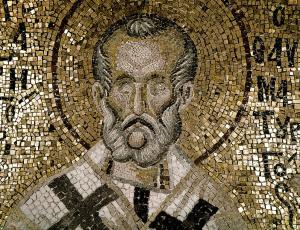
It is impossible to study patristic theology, to study the teachings of the early church mothers and fathers, without recognizing the tremendous influence Origen had on the development of Christian thought. Origen taught and inspired many who came after him; indeed, even those who would criticize some of his speculative theology would, in order circumstances, find themselves studying what he said and applying it in their own writings. Both Theophilus of Alexandria and St. Jerome, known for their crusade against Origenism, are profoundly influenced by Origen and often mirror what Origen had to say in their own works. It should not be surprising, therefore, if Origen’s greatest critics couldn’t entirely dismiss Origen’s contributions to theology, we will find many who looked up to Origen and praised him without question, among them being St. Gregory the Wonderworker. We find, like St. Athanasius later, Gregory would use what he learned from Origen to correct theological error, such as for example, the errors of the modalists concerning the Trinity. While many would later question Origen’s Trinitarian thought, it is clear, we find many defenders of the Trinity wanting to show how Origen’s teachings supported orthodox teaching. Origen really was at the forefront of early Christian theology, more than perhaps Origen’s western equivalent, Tertullian, and far more profound in his thought than Tertullian, which is why even those who opposed Origen could not entirely distance themselves from the contributions Origen gave us to Christian theology. St. Gregory the Wonderworker, therefore, was right in expressing his gratitude for Origen:
Ingratitude appears to me to be a dire evil; a dire evil indeed, yea, the direst of evils. For when one has received some benefit, his failing to attempt to make any return by at least the oral expression of thanks, where anything else is beyond his power, marks him out either as an utterly irrational person, or as one devoid of the sense of obligations conferred, or as a man without any memory. And, again, though one is possessed naturally and at once by the sense and the knowledge of benefits received, yet, unless he also carries the memory of these obligations to future days, and offers some evidence of gratitude to the author of the boons, such a person is a dull, and ungrateful, and impious fellow; and he commits an offense which can be excused neither in the case of the great nor in that of the small:— if we suppose the case of a great, and high-minded man not bearing constantly on his lips his great benefits with all gratitude and honour, or that of a small and contemptible man not praising and lauding with all his might one who has been his benefactor, not simply in great services, but also in smaller. Upon the great, therefore, and those who excel in powers of mind, it is incumbent, as out of their greater abundance and larger wealth, to render greater and worthier praise, according to their capacity, to their benefactors.[1]
We can and should have gratitude for those who have taught us in our faith, those who have helped us understand our faith and explore it in more detail, and those who have exhorted us to take our faith seriously enough to develop and engage it for ourselves. Gregory was taught by Origen and addressed him in person, giving Origen his due, something which the church as a whole should do, not because Origen was perfect, nor because all he that said or did was right, but because he gave us the foundational methods we need to develop our faith. We can recognize his contribution while disagreeing with him, as we can and should do with anyone who helped inspire our faith. We should be able to accept that people will be imperfect. We can still learn from people who have made mistakes, even grave mistakes.
When we look back to the patristic era, we find many heretics were the teachers of saints, and many saints taught those who became heretics; we can learn from heretics, just like the saints did, even as the writings and thoughts of the saints, when taken to an extreme, can lead people to heresy. It is important for us to look for and engage the truth where it can be found, allowing the insight we gain from it properly guide us in our own theological development, sometimes finding that such insight undermines various biases we have inherited from the past. After all, is that not what has happened with many theological or moral developments in Christianity, such as seen in teachings dealing with slavery or the death penalty?
We must engage the truth where it can be found, and use it to promote what is good and just – indeed, the more we engage the truth, the more we shall find the fruit of the truth in our lives: “for the fruit of light is found in all that is good and right and true” (Eph. 5:9 RSV). We are to expose the darkness wherever it may be found, even if it is found within our own religious community. The light must shine in the darkness, dispelling the shadow so that all can become imbued with the light and the goodness which it inspires: “Take no part in the unfruitful works of darkness, but instead expose them” (Eph. 5:11 RSV). We are to understand that our temporal existence gives us the time we need to shape our own personal character and what we will be in eternity. We must not become too attached to material gain. While material wealth can be a good, when used properly, that is, when we treat ourselves as its stewards, using it to promote the common good and not just our private good, if we become too attached to it, we become too attached to that which will not last, and our use of it will be sinful. Its value is relative, and is connected to temporal circumstances; its value in eternity will be negligible at best, but other wealth, that of personal character, will stay with us and prove to have eternal value. Knowing, therefore, that we will be called to task as to how we used the gifts we have been given in our lives, including our material wealth, we should heed Jesus said when he warned us we will eventually find ourselves unable to enjoy all the material goods we have accumulated for our private gain, finding that no matter how much we have, it will not help us in eternity:
And he told them a parable, saying, “The land of a rich man brought forth plentifully; and he thought to himself, `What shall I do, for I have nowhere to store my crops?’ And he said, `I will do this: I will pull down my barns, and build larger ones; and there I will store all my grain and my goods. And I will say to my soul, Soul, you have ample goods laid up for many years; take your ease, eat, drink, be merry.’ But God said to him, `Fool! This night your soul is required of you; and the things you have prepared, whose will they be?’ So is he who lays up treasure for himself, and is not rich toward God” (Lk. 12:16-21 RSV).
Let us, therefore, heed the wisdom of the past, while using it to develop ourselves and our insight into what is good and truth, letting the light shine in the darkness so that the darkness of error can be further eroded over time. Let us thank those who have helped us discern something of the light, even if we must, in doing so, acknowledge where they were in error. We do not have to be stuck with the ways of the past, thinking there can be and will be no positive change. We have, over time, improved our understanding on many issues, but we do so standing on the shoulders of those who came before us. We can see further than they, but we would not be able to do so without their help. Let us, therefore, remember what Jesus said: we should lay for ourselves treasures in heaven, in eternity, which is what we will do when we cooperate with grace and follow the way of love. Finally, we should take what we have learned and use it, lest it becomes, like material wealth, something which we have accumulated and yet will be of no good for us because we have not used it properly.
[1] St. Gregory the Wonderworker, Oration and Panegyric Addressed to Origen in ANF( 6):23.
Stay in touch! Like A Little Bit of Nothing on Facebook.
If you liked what you read, please consider sharing it with your friends and family!
N.B.: While I read comments to moderate them, I rarely respond to them. If I don’t respond to your comment directly, don’t assume I am unthankful for it. I appreciate it. But I want readers to feel free to ask questions, and hopefully, dialogue with each other. I have shared what I wanted to say, though some responses will get a brief reply by me, or, if I find it interesting and something I can engage fully, as the foundation for another post. I have had many posts inspired or improved upon thanks to my readers.













